We all witnessed the dramatic effects of the COVID-19 pandemic one way or another, but it’s safe to say couples had a particularly hard year.
Those who planned to get married faced venue and register office closures, while additional restrictions and social distancing laws limited the number of guests for those that were able to go ahead later that year.
But that didn’t stop registrars helping couples make up for lost time when restrictions ended, with tens of thousands of ceremonies going ahead in-between lockdowns.
Today in the Stopford blog, we delve into the statistics surrounding marriage ceremonies during the pandemic year and explore the trends in more detail.
Total marriages in the pandemic year:
The ONS (Office for National Statistics) published the statistics for 2020 last year (2023), covering both opposite-sex and same-sex marriages in England and Wales during the pandemic.
Unsurprisingly, the marriage rate dropped by 61% compared to 2019 datasets. According to the data, the total number of marriages in England and Wales in 2020 was 85,770, down from 219,850.
Counties with the most marriages (2020):
The number of registered ceremonies within the counties were beyond the usual compared to the datasets of 2019, with declines as high as 69.3%.
The highest volume of marriages in the UK took place in Kent, with only Hampshire and Hertfordshire also breaching 2,000+ ceremonies.
Check out our round up of the top 5 busiest county councils for marriage ceremonies below:
| Ranking/Council | 2020 | 2019 | Decline |
| 1. Kent | 2,280 | 6,850 | 66.7% |
| 2. Hampshire | 2,155 | 5,710 | 62.3% |
| 3. Hertfordshire | 2,019 | 4,297 | 53.0% |
| 4. Essex | 1,927 | 6,277 | 69.3% |
| 5. Surrey | 1,855 | 4,499 | 58.3% |
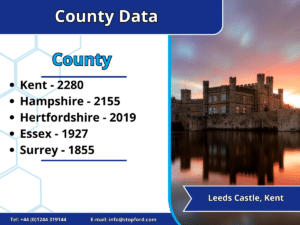
Metropolitan districts with the most marriages (2020):
Even the busy metropolitan boroughs saw huge declines in the number of marriages that took place in 2020.
Birmingham, the biggest metropolitan and the largest local authority in Europe, saw declines as big as 63.7%, while Manchester hopped above Leeds and Liverpool (who were higher in 2019), seeing a smaller decline of just 52.4%.
See below for a list of metropolitan districts with the highest number of ceremonies:
| Ranking/Council | 2020 | 2019 | Decline |
| 1. Birmingham | 882 | 2,428 | 63.7% |
| 2. Manchester | 857 | 1,799 | 52.4% |
| 3. Leeds | 742 | 2,041 | 63.6% |
| 4. Liverpool | 730 | 1,912 | 61.8% |
| 5. Sheffield | 550 | 1,715 | 67.9% |
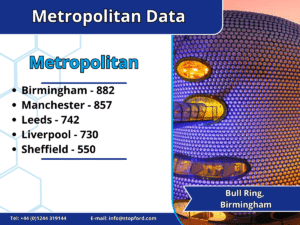
Unitary authorities with the most marriages (2020):
Unitary authorities come in all shapes and sizes and saw different results. Cornwall and the Isles of Scilly lead this council type with 1,638 marriages, the only authority to maintain over 1,000+ ceremonies compared to their 2019 performance.
Amongst the unitary authorities, Bristol City Council also performed particularly well, with a low reduction on volumes during that year, leapfrogging their counterparts in Cheshire East, Northumberland and Bournemouth, Christchurch and Poole.
Let’s look at the unitary authorities who hosted the most ceremonies:
| Ranking/Council | 2020 | 2019 | Decline |
| 1. Cornwall and Isles of Scilly | 1,638 | 3,763 | 56.5% |
| 2. Bristol | 862 | 1,596 | 46.0% |
| 3. Cheshire East | 836 | 2,473 | 66.2% |
| 4. Northumberland | 757 | 2,186 | 65.4% |
| 5. Bournemouth, Christchurch and Poole | 753 | 1,807 | 58.3% |
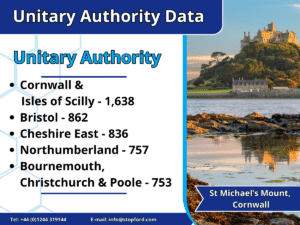
London boroughs with the most marriages (2020):
Bucking the trend in England and Wales, Brent and Kensington and Chelsea were the only councils to have ceremonies decline below 25%. Brent also stood out by having lower than 1,000 ceremonies in 2019 to appear 3rd in our 2020 list, leaping over their counterparts in Islington and Haringey.
Another notable datapoint is that Westminster held the highest number of same-sex marriages (83) in 2020.
See the top 5 London boroughs for the number of marriage ceremonies below:
| Ranking/Council | 2020 | 2019 | Decline |
| 1. Westminster | 1,380 | 2,681 | 48.5% |
| 2. Kensington & Chelsea | 1,271 | 1,689 | 24.7% |
| 3. Brent | 864 | 974 | 11.3% |
| 4. Islington | 676 | 1,601 | 57.8% |
| 5. Haringey | 670 | 1,102 | 39.2% |
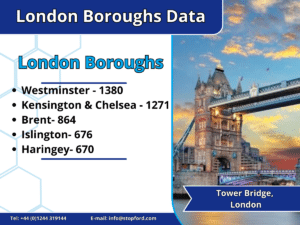
Welsh councils with the most marriages in 2020:
It was a particularly difficult year for Welsh authorities, who saw 9 councils suffer declines of over 70% or over.
Of the authorities with the highest volumes, Newport saw the smallest decline, halving their 2019 figure. The top 3 all consist of locations in the south of Wales, with both Cardiff and Swansea seeing big reductions on their ceremony numbers.
Here is a comparison of Welsh ceremonies data:
| Ranking/Council | 2020 | 2019 | Decline |
| 1. Cardiff | 631 | 1,357 | 53.5% |
| 2. Swansea | 423 | 1,123 | 62.3% |
| 3. Newport | 252 | 515 | 51.1% |
| 4. Powys | 243 | 797 | 69.5% |
| 5. Flintshire | 209 | 552 | 60.0% |
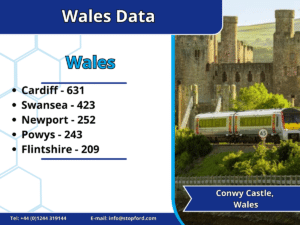
Which council suffered the biggest percentage change in marriage ceremonies?
According to the ONS’s percentage change map, Walsall and Bedford saw the biggest decline in marriages with an 81% drop.
What about trends for civil and religious ceremonies?
As per ONS records, in the past 30 years, there has been an increase in the percentage of marriages performed as civil ceremonies. In the last four years alone, civil ceremonies have risen from 76% (2016) to 85.5% (2020) in England and Wales.
Consequentially, religious ceremonies have declined year-on-year.
Top dates and days for marriages in 2020:
- 264 marriages took place between 24th March – 3rd July 2020, accounting for 0.3% of the total marriages in 2020.
- Saturdays were the most popular day for weddings.
- September was the most popular month for opposite-sex weddings.
- 26th September was the most popular date for opposite-sex marriages, with 1,726 marriages recorded.
- October was popular for the same-sex marriages.
Note: The national lockdown was introduced on 23rd March 2020.
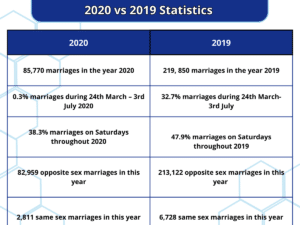
Ready to modernise how you manage ceremonies?
Stopford is the leading name in civil registration software, serving over half of registration services in England and Wales. From appointments and certificate stock to all-in-one ceremony management, our solutions help cut time-consuming admin and deliver excellent customer experiences.
Contact us today to get a demo of our suite of ceremony solutions, including ceremony booking, final ceremony payment and Ceremony Planner.